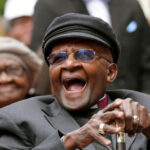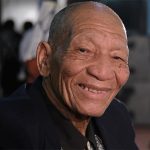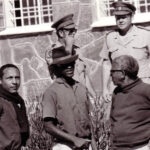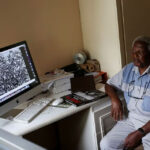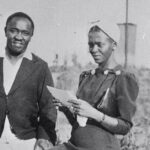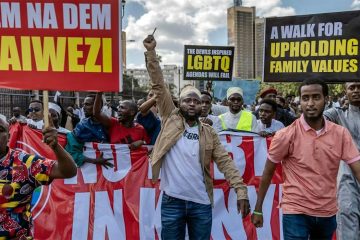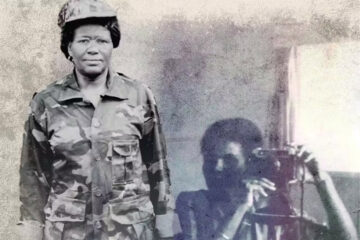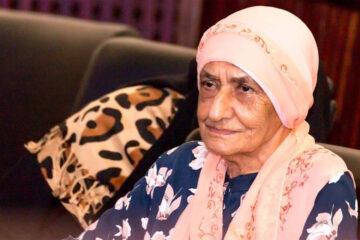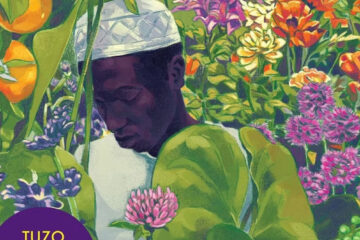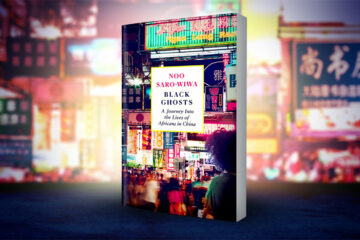
THIS is an edited extract from a new biography about Dennis Brutus, the anti-apartheid activist, poet and author. Brutus died in 2009. The extract records Brutus’s reluctance to write about his life when he was still alive. But as Tyrone August, author of the biography, writes, it was inevitable that his life story would eventually be told: “Brutus’s life is woven far too deeply into the fabric of the recent history of South Africa.”
Dennis Brutus, the South African poet and veteran anti-apartheid activist, lived in Port Elizabeth, in the Eastern Cape, during the first half of the twentieth century. This tumultuous period saw the emergence of apartheid, a legally codified system of racial segregation and discrimination. It was followed by the development of a ruthless state apparatus designed to systematically eliminate any resistance.
It was in these grim circumstances that Brutus, who was classified as coloured – a term used to refer to people of mixed European (“white”) and African (“black”) or Asian ancestry – under the Population Registration Act of 1950, distinguished himself as a student, teacher, poet, journalist, sports administrator and anti-apartheid activist.
Yet, despite this range of achievements, there was not a single biography on him – until now. Nor did he publish any extended autobiographical work in a single volume. In a letter to the South African writer and academic Es’kia Mphahlele in November 1970, he confirmed his ambivalence about
get (ing) that mess of autobiographical material out of my system.
He expressed a similar sentiment in a tape recording in October 1974, and attributed his reluctance to embark on a full-scale autobiography to his belief that there was no coherent or unifying narrative in his life.
I fail to see in my life any kind of cohesion or pattern or unifying thread which would justify an autobiography … It seems to me that autobiographies need organisation of one’s knowledge of one’s life in such a way that a pattern emerges, some kind of intelligibility is made of the mass.
He added emphatically that he saw no such pattern in his life. And, until he could impose some such order on what had happened to him, it didn’t seem to him that he was entitled to write about it. He thought that, although some instances in his life might be exciting or flattering to him, they did not justify a book.
Aversion and ambivalence
Despite his aversion to writing an autobiography, Brutus conceded in the same tape recording that he was beginning to find the prospect “less repellant” than before. He went on to entertain the possibility of at least writing what he described as fragments of an autobiography in the form of essays.
So, by the time Hal Wylie, a University of Texas academic, approached him in 1988 about working towards an autobiography, he was more amenable to the idea. Wylie offered to assist with “spade-work and organising, etc”.
He tried to persuade Brutus that an autobiography would be preferable to an academic work on his life as it would be enriched by certain poetic and literary qualities. It could focus on existential details, memories, personal aspects that would not be appropriate for an official biography, but would be more striking, interesting, with greater human interest.
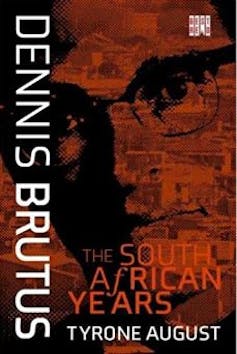
In an admittedly subjective work one would have more choice and editorial focus. It would be more direct and forceful.
In addition, Wylie submitted that Brutus’s life was closely interlinked with the rise of apartheid and, at the same time, offered “a new way of looking at the anti-apartheid struggle”. He drew particular attention to Port Elizabeth and the Eastern Cape as major sites of this struggle. In response, Brutus wrote encouragingly: “I like the project.”
Nevertheless, Brutus expressed concern about the amount of work required by an autobiography. Instead, he advised, he would still prefer a biography written by Wylie or, alternatively, a biography “as told to Hal Wylie”. Despite his reservations about writing a fully fledged autobiography, Brutus started working with Wylie on a rough draft. This effort was provisionally titled – in a handwritten addition – The Autobiography of the South African Troubadour (or, alternatively, The Story of a Troubadour/Griot).
Wylie recalled in personal correspondence how this draft was created: “It was based on tapes that Dennis recorded, which I then transcribed and typed up. It was then supplemented with additions he wrote in by hand and responses he gave me in response to my questions.”
However, this collaboration eventually collapsed. “When we got to late adolescence and adulthood he clammed up and wouldn’t respond to further questions, so it was abandoned at that point”, Wylie stated.
He then passed the project to another biographer, whose name has since escaped him, but it did not get any further. This is not surprising.
A simple lust
Although initially Brutus felt sufficiently comfortable about working with Wylie on an autobiography, he continued to harbour deep suspicions about the intrusive nature of biographical writing.
His discomfort with the possibility of potential biographers invading his private life is clearly reflected in an untitled poem published in 1973 in his collection, A Simple Lust:
Finding this rubbish,
this debris,
of mine after
I am dead,
when they come to pry
mouse-rustling in my papers,
ghoulishly-hopeful in my things,
what rubbish they will find!
Will I shrivel, inanimate, in my shame?
Will the dead flesh curl up in protest
being assessed by curious strangers’ hands?
A life woven in history
But, in the long run, renewed interest from potential biographers was probably inevitable. Brutus’s life is woven far too deeply into the fabric of the recent history of South Africa. This is true especially of the first four decades of his life, which, as the most important period in his personal, literary and political development, is the particular focus of Dennis Brutus, The South African Years, published by Best Red, an imprint of HSRC Press. Brutus died of prostate cancer at his home in Cape Town on 26 December 2009. – The Conversation


